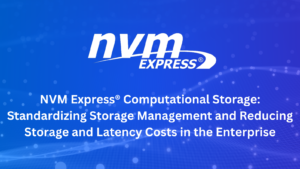
NVM Express® Computational Storage: Standardizing Storage Management and Reducing Storage and Latency Costs in the Enterprise
BlogBy: Bill Martin, Samsung, and Kim Malone, Intel
Cloud, enterprise and IoT spaces are currently processing an unprecedented amount of data to meet the ever-evolving demands of the storage industry. This increased demand is increasing network bandwidth and straining host compute resources—leading to increased network bandwidth usage, host memory and CPU utilization and system performance bottlenecks. We developed the NVM Express® (NVMe®) Computational Storage feature to address these performance issues and enable a standardized mechanism for vendors to include streamlined computational features across their architectures.
Introducing Computational Storage
With Computational Storage, NVMe devices are capable of offloading compute from the host and completing it on the device itself, reducing data movement by only returning the results of the computation to the host. By reducing the number of data transfers necessary for computation, systems can experience faster response times for critical data applications. Computational Storage also enables an open, interoperable ecosystem, allowing customers to pick and choose from available interoperable products to architect and create their larger device ecosystem.
Key Computational Storage Features
NVMe Computational Storage consists of two command sets: Computational Programs and Subsystem Local Memory. The Computational Programs command set enables NVMe devices to operate on data located in the NVM subsystem, using commands to manage programs for computation on the device. Subsystem Local Memory allows local memory in an NVM subsystem to be accessed via NVMe I/O commands using an NVMe transport. Subsystem Local Memory also includes new commands for reading, writing and copying user data to memory on the device.
Important Use Cases for Cloud, IoT and Edge Environments
Computational Storage enables cloud, IoT and Edge environments to experience peak system performance with streamlined computational processes. Computational Storage offloads compute to the edge, completing the entire compute process on the NVMe device and transporting the results back up to the primary compute. Computational Storage is vital for driving reduced network bandwidth utilization across the cloud, IoT and edge spaces. Furthermore, by shifting the compute to an NVMe device, Computational Storage frees up fabric utilization across the entire system, delivering reduced TCO for data center environments.
Learn More
If you’re an NVM Express member interested in getting involved, join the task group on Causeway. You can also view a recording of our recent Flash Memory Summit 2023 presentation on the NVM Express YouTube channel.